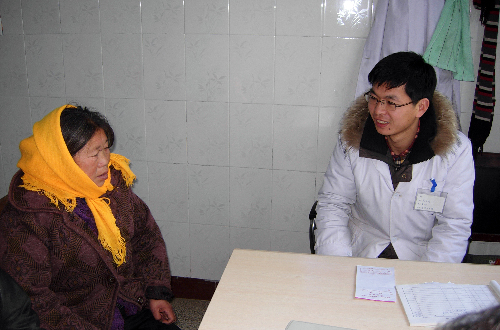|
 |
|
LOW-COST TREATMENT: Doctor Liu Shijun treats a patient in Longhe Hospital. The new rural cooperative medical system in Ganyu County is benefiting local people. (PHOTO BY NI YANSHUO) |
The extremely cold weather that has ravaged large parts of the northern hemisphere this winter also took its toll on the small village of Dazhuyin in Ganyu County, east China's Jiangsu Province. The dry, freezing days laid low scores of villagers who suffered from bad colds and coughs. Thirteen-year-old Liu Jingdi was one of those affected badly by the cold, and had to be hospitalized at the nearby Longhe Hospital.
Liu was put onto an intravenous drip, which he said made him feel much better and for which his father paid 15 yuan ($2.38).
"Thanks to the new rural cooperative medical system, our payments for medical treatments have been cut greatly," said Liu Shunqiang, the boy's father. "Before the system [was implemented in Ganyu], it was impossible to have medical treatment for less than 100 yuan ($15.87) even for a slight cold."
Cheap healthcare
Liu is one of the 1.07 million Ganyu people who have been benefiting from the new rural cooperative medical system, which was implemented in Ganyu County as a pilot project in September 2003.
According to the system, each person who voluntarily participates pays 50 yuan ($7.94) a year to his or her account and gets a medical card; and in turn the government subsidizes 240 yuan ($38.1) to the account each year. With the medical card, the patient can go to any county, town and village-level hospitals and enjoy a 45-percent cost reduction for clinic treatments and up to 85-percent reduction for hospitalization. Meanwhile, the system also requires all designated hospitals to sell medicines at cost price. Liu Shunqiang said he could see more than two-thirds reduction in his medical treatment expenditure since the system began. Liu's family was among the first to participate in the system in 2003.
"The new rural cooperative medical system has been greatly benefiting patients by reducing their expenditures on medical treatment," Liu Shijun, a doctor of Longhe Hospital, told ChinAfrica.
Doctor Liu noted that before the medical system was implemented in Ganyu, doctors' salaries were paid from hospital profits, but now as many hospitals (including Longhe) do not make profit due to the cost reduction in medical treatment, it is the government subsidies that sustain the operation.
The new system is influencing not only local hospitals, but also farmers in their attitudes toward medical treatments.
According to Doctor Liu, before the new system was launched, many patients were reluctant to go to hospital when they got sick because of the high cost of medical treatment. Many would rather buy cheap medicines from drug stores than go to see a doctor.
Official statistics show that a Ganyu farmer's net income in 2003 was only about 3,300 yuan ($523.8); in contrast, the average rural expense for treatment of a serious disease is more than 7,000 yuan ($1,100). "A serious disease can drop a family in a rural area into heavy debt, especially in poor Ganyu County," said Doctor Liu.
Doctor Liu said he and his colleagues now treat more than 150 patients a day. "In winter when the cold is rampant, we have to treat more than 200 patients a day," he said, adding that this figure is many times higher than pre-2003.
|